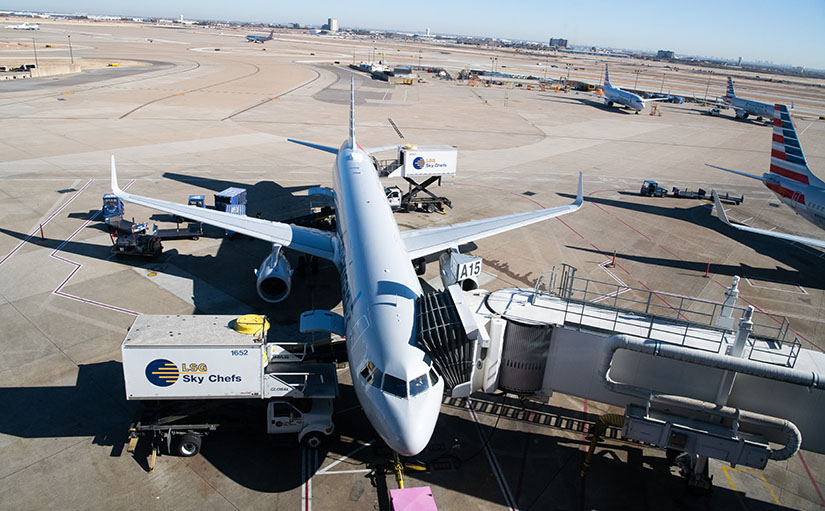NREL Addresses Energy Challenges for Sustainable Aviation
From Sustainable Fuels to Airport Infrastructure Analysis to Next-Gen Aircraft, NREL Offers Solutions for Lowering Emissions in a Sector That Is Among the Most Difficult To Decarbonize

With the aviation industry contributing 2.5% of global carbon dioxide emissions, a clean energy transformation in aviation operations will prove essential to mitigate climate change. Cutting-edge research is paving the way.
The National Renewable Energy Laboratory (NREL) leverages advanced data analytics to help guide mobility transformations as part of a new sustainable aviation research initiative. Major transportation hubs, fuel producers, airlines, and aircraft manufacturers tap NREL's unique capabilities in sustainable fuels analysis, resilience, electrification, and large-scale validation and modeling to understand how to achieve ambitious energy-saving goals, improve regional air quality, and optimize the movement of people and goods.
"It's an incredible time to be involved in a mobility revolution," said NREL Strategic Partnerships Manager Brett Oakleaf. "The challenges with decarbonizing aviation are daunting, but the goal of NREL's lab-wide sustainable aviation initiative is to bring coordination among all stakeholders at the public and private levels to develop new analysis and tools to address those energy challenges together. It's challenging and gratifying at the same time."
NREL Research Develops Holistic Aviation Solutions
NREL's sustainable aviation research focuses on three sectors that must collaborate for large-scale deployment: sustainable aircraft, fuels and energy carriers, and airport infrastructure. This approach aims to not only permanently lower the carbon intensity of flight but also fundamentally boost the mobility and resiliency of the entire aviation ecosystem.
Low-carbon fuels and energy carriers are key to improving aircraft of the future. Low- and net-zero-carbon aviation fuels being developed are chemically similar to conventional jet fuel but are produced from a vast range of feedstocks. Much like optimizing aircraft design, sustainable fuel alternatives also hold great potential to create new economic opportunities, reduce carbon emissions, and bolster aircraft performance. From field to fuel, electron to molecule, and bench to pilot scales, NREL develops and demonstrates low- and lower-emission biofuels by drawing on extensive experience in biomass conversion, as well as in fuel properties and combustion.
Sustainable aircraft of the future will also require advanced, lightweight energy systems that prioritize safety and reduce emissions. These areas of interest include optimizing power electronics, energy management strategies, material composites, and more. Designing more efficient aircraft system components will ultimately lower energy consumption while enhancing performance. NREL develops these systems and components with advanced power electronics and electric machines experimentation facilities that feature a range of equipment and enable world-class experimental and modeling capabilities.
Compounding the needs of electrified aircraft and alternative fuels, including hydrogen and sustainable aviation fuels, is the necessity for resilient energy supply at airports. The varied energy demands of aviation hubs such as airports, military bases, and vertiports will require airport infrastructure that can generate energy on-site, use advanced communications, and accommodate future growth. With state-of-the-art energy testing, modeling, and analysis capabilities, NREL creates innovative and tailored solutions for infrastructure upgrades that adapt complex legacy transportation networks.
Collaborative, Partner-Enabled Strategy
NREL partners with stakeholders from across the aviation ecosystem to identify critical needs that will accelerate the transition to sustainable aviation. In partnering with other labs, universities, and colleges, NREL combines scientific knowledge and state-of-the-art facilities to research and deploy technologies in practical applications. NREL also enters multiyear partnership agreements supporting development, funding, and implementation of projects based on shared interests with governments, communities, utilities, industry leaders, and more.
"Partners look to us for upfront strategic decision support and project de-risking from a technical and integration perspective because of our unique capabilities," Oakleaf explained. "We look to work with many aviation stakeholders because there's a host of energy challenges that we can only solve together."
Learn more about NREL's sustainable aviation research, how to partner with NREL, and the unique capabilities the laboratory offers airports and seaports.
This article has been updated to reflect an editorial change made after its original publication.
Last Updated May 28, 2025
